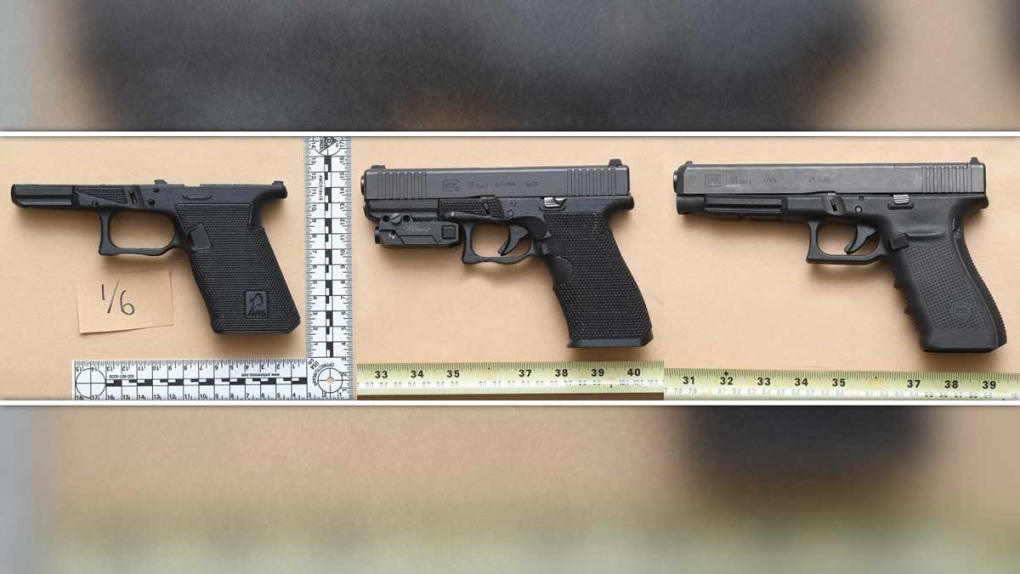Winnipeg police disrupt "ghost gun" operation; two facing charges
 Police believe a criminal network solicited and paid legitimate 3D printer services to make handgun lower receiver assemblies, also known as receiver blanks. (Source: Winnipeg Police Service)
Police believe a criminal network solicited and paid legitimate 3D printer services to make handgun lower receiver assemblies, also known as receiver blanks. (Source: Winnipeg Police Service)
Two men are facing charges after police say a criminal network paid legitimate printer services to make parts for illegal 3D-printed handguns.
The Winnipeg Police Service (WPS) said its firearms investigation and enforcement unit began a probe into the manufacturing and trafficking of illicit 3D-printed guns in November.
Police say a criminal network solicited and paid legitimate 3D printer services to make handgun lower receiver assemblies, also known as receiver blanks.
Officers say they believe the blanks were made into working “ghost guns” and trafficked to criminals.
On Nov. 2, police searched a home in the 3000 block of Pembina Highway, finding 3D printers, laptops, cell phones and spools of 3D filament.
Investigators believe about 15 firearm receivers were made.
A 30-year-old man from Winnipeg is facing weapons trafficking charges.
He was released on an undertaking.
Investigators then searched a home in the 400 block of Tim Sale Drive and found similar materials.
A 19-year-old man from Winnipeg is facing weapons trafficking charges and was released on an undertaking.
Additionally, police say a 45-year-old man from Winnipeg was arrested in relation to 3D-printed lower firearm receivers, but was subsequently released with no charges by Crown authorization.
None of the charges have been tested in court.
CTVNews.ca Top Stories

'Pretty limited' options for Liberal MPs calling for leadership change
As calls mount within the federal Liberal Party for Prime Minister Justin Trudeau to step down as leader, one political analyst says there’s little his detractors can do to force his hand.
2 teenagers arrested, 1 suspect at-large after attack involving bear spray, machete
A pair of teenaged boys have been charged with aggravated assault after police said they attacked a man with bear spray and a machete Friday evening.
Possible explosion at Metro Vancouver strip mall under investigation
Police and firefighters were called to the scene of a potential explosion at a Metro Vancouver strip mall Sunday morning.
A plane crashes and bursts into flames while landing in South Korea, killing 179
A jetliner skidded off a runway, slammed into a concrete fence and burst into flames Sunday in South Korea after its landing gear apparently failed to deploy. All but two of the 181 people on board were killed in one of the country’s worst aviation disasters, officials said.
Recognize the name Jolt Cola? The 1980s soda aims to make a comeback — this time with even more caffeine
Jolt Cola, the soda brand that gained attention in the 1980s for offering “all the sugar and twice the caffeine,” is heading back to stores in 2025. This time, it’s promising more than twice the original caffeine content.
Looking to get rid of your Christmas tree? This farm will feed it to its goats
Now that the holidays are almost over, many people may be looking to dispose of their Christmas tree. One farm in Massachusetts is letting people do just that, in a furry and eco-friendly way.
'Let's not panic': Canada picks up the pieces after ugly Latvia loss at world juniors
Canada was embarrassed on home soil 3-2 by Latvia — a country it had thumped by a combined 41-4 score across four previous meetings — in a shocking shootout Friday.
4.1 magnitude earthquake in western Quebec felt in Ottawa and Montreal
The earth moved in the Maniwaki area this Sunday morning. No damage was reported after a 4.1 magnitude earthquake rattled the Maniwaki area in western Quebec, according to Earthquakes Canada.
'Sonic 3' and 'Mufasa' battle for No. 1 at the holiday box office
Two family films dominated the holiday box office this week, with 'Sonic the Hedgehog 3' winning the three-day weekend over 'Mufasa' by a blue hair.

































